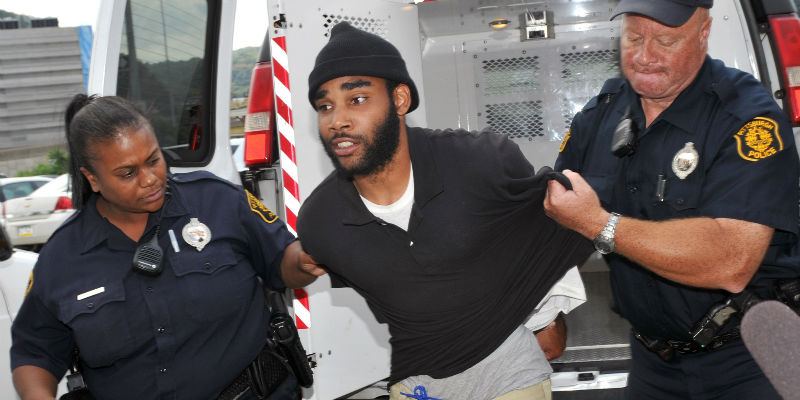
Klein Michael Thaxton, center, is lead into Pittsburgh Police headquarters after being apprehended without incident at Three Gateway Center in Pittsburgh, Friday Sept. 21, 2012. Thaxton held a businessman hostage inside the office building for more than five hours Friday, posting Facebook updates during the standoff, and surrendered to authorities without incident, police said. (AP Photo/The Tribune-Review, JC Schisler)
PITTSBURGH — Klein Michael Thaxton hadn’t been much of a Facebook user. He posted no status updates for two years. On Friday, though, he surfaced with a jarring post: “i cant take it no more im done bro.”
The 22-year-old U.S. Army veteran was on the 16th floor of a Pittsburgh office building, armed with a hammer and kitchen knife and holding a businessman hostage, police said.
He surrendered after more than five hours. Neither he nor the hostage, Charles Breitsman, 58, was injured. But Thaxton’s real-time Facebook updates — coupled with online pleas by his friends to surrender — vividly illustrated the challenges when social media plays a role in a crime in progress.
Thaxton sent seven messages, many of them despairing.
“this life im livin rite now i dnt want anymore,” said one post. “ive lost everything and I aint gettin it back.”
Thaxton’s friends urged him to end the situation peacefully. One asked him to think of his mother.
“dude, you gotta purpose here in life, and this ain’t it yo, people do care man, they do,” another wrote.
Police at first wanted the Facebook page kept open, hoping to gain useful information, but they later asked Facebook to take it down so Thaxton could focus on communicating with authorities.
The Facebook exchanges had the potential to both help and harm, Police Chief Nathan Harper said.
Thaxton served in the army from December 2008 to June 2010. He also has a criminal record, including a guilty plea to robbery earlier this year in a special court for military veterans with mental health or addiction problems.
In the past when there was a hostage situation, police would call the telephone company and ask that the hostage-taker’s phone number be changed immediately so no one else could call it, said Gary Noesner, a former chief of the FBI’s crisis negotiation unit.
In this case, countless people had the ability to communicate with Thaxton, “for better or for worse,” said Steve Jones, a professor who studies online culture at the University of Illinois at Chicago.
A former criminal profiling expert with the FBI, Mary Ellen O’Toole, said the decision by police to ultimately shut down Thaxton’s Facebook page made sense.
“You really do have to be very careful. It may not take much to make that person even more erratic, more irrational,” she added, noting that negative posts “could really cause him to go terribly sideways.”
Harper said police counted 700 posts, most of them helpful to police in that they expressed concern for Thaxton or encouraged his surrender. But some were “ridiculous” and others “outright distasteful,” the chief said.
If police determine any of the posts urged Thaxton to harm Breitsman or himself, those people could eventually face charges, too.
Investigators determined that Thaxton picked Breitsman’s office at random after noticing through a glass door or window that Breitsman had an iPhone, computer and TV in his office that Thaxton believed he could use to call attention to himself, Harper said.
Investigators would like to know why Thaxton wanted to create a public spectacle, Harper said, “but we will leave that to the mental professionals to figure that out and get the man some help.”
Thaxton was charged with kidnapping, terroristic threats and aggravated assault and may be charged with escape once police identify the halfway house where he was reportedly living after a recent carjacking conviction, Harper said.
Police spokeswoman Diane Richard said Breitsman was able to meet with his family after Thaxton surrendered.
“He is doing OK at this point, a little shaken up,” Richard said.
Facebook did not comment on the hostage-taking but referred reporters to a page describing how it works with law enforcement. The page says Facebook may share information with law enforcement if deemed necessary to “prevent imminent bodily harm” to someone.
___
Associated Press writers Kevin Begos in Pittsburgh and Michael Rubinkam contributed to this report. AP Technology writer Barbara Ortutay and AP news researcher Jennifer Farrar contributed from New York.